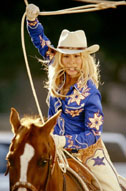
Movie Guru Rating:

Comment
on this review
| |

The crazy, cross-referenced Charlie's Angels sequel is hellishly good
by Jesse Fox Mayshark
The morning before I went to see Charlie's Angels: Full Throttle, I got online and bounced over to my favorite music message board, where someone had posted a link to a new mash-up recording. Mash-ups (a.k.a. bootlegs—a word that somehow never goes out of style, accumulating new meanings every five or 10 years) are homemade audio splices wherein some clever bedroom remixer lays the vocal from one track over the music from another track. This is harder to do than it might sound, and especially hard to do well.
The track in question layered 50 Cent's "Wanksta" over Devo's "Whip It," producing a hybrid with the cute title "Whipsta"—cute titles are an important part of the maturing mash-up universe, which has already been around long enough to produce its own superstars and even an "oh-it's-boring" backlash. The mix was good enough to keep me entertained for two listens, which is an eternity in the broadband age.
Anyway, having started my day with a pleasant dose of digital genre-bending and manipulation, I was well equipped for the ridiculous, riotous high voltage of Full Throttle. The entire movie is like an extended mash-up of, well, everything you've ever seen or heard. It begins with a scene that manages to pay direct homage to both Raiders of the Lost Ark and Return of the Jedi, with a little Urban Cowboy thrown in, and proceeds nonchalantly through the first of many astonishing action sequences, all of them scored to a nonstop soundtrack that manages to find room for everything from the Beach Boys to Snoop Dogg to Electric 6 to Journey.
It's a hypertext movie, emphasis on the hyper, with every scene hotlinked to the part of our brain that stores pop-culture detritus. The Angels dancing to MC Hammer; the Angels disguised as welders while the soundtrack cues the theme from "Flashdance"; the Angels dressed as nuns, as strippers, as men. Even the cameos are smart jokes—Bruce Willis, one-time king of the action movie, shows up early just so he can get killed, implicitly leaving the genre open to the tuff girls in tight pants.
I loved the posters for Full Throttle, which—with Cameron Diaz's fingers making a "two" sign behind her leather-clad butt—paid hilarious homage to Loverboy's homoerotic (and Canadian!) Get Lucky album cover (and yes, Loverboy's on the soundtrack too). But even though I enjoyed the first Charlie's Angels movie more than I expected, I assumed the sequel would be your typical grab-bag of reheated gags and slapdash dollar-chasing. I was, happily, wrong.
Full Throttle might or might not be a classic, but it is surely the best Hollywood movie of this very strange summer. In a year when America seems extremely unsure of what it is or wants to be—World conquerors or jes' plain folks? Chaste naifs or legal sodomizers?
Full Throttle splits all the differences. It is not feminist or anti-feminist, exploitation or exoneration, ironic or sincere; it is all of the above, and more. The movie contains multitudes. And it wraps it all in up-to-the-millisecond digital effects that make the Matrix sequel look poky by comparison.
The Charlie's Angels movies, produced by co-star Drew Barry-more, don't do anything that hasn't been done before. Plenty of other TV shows have been reconstituted as motion picture franchises, and some (the Brady Bunch movies, for example) have even taken tongue-in-cheek deconstructive tongs to their source material. The first Charlie's Angels movie made light jabs at the TV show's condescending sexism, while also providing plenty of nudge-wink ogling of its stars' tits and asses. It had its cheesecake and ate it too.
But Full Throttle turns it up all the way around. It's faster and louder and flashier, sure, but it's also smarter and funnier and sexier and softer, all at once. It's more butch and more femme. By the time you reach the delirious conclusion, which includes a devilish Demi Moore licking Cameron Diaz's face while holding a golden gun to her temple, you are deep into the heart of pop culture madness, without a compass or a GPS signal to guide you. It might be hard at any given second to say what any of it means, but that whole question seems somewhat behind the point. The movie is a running commentary on itself and on the culture that produced it.
And it likes what it sees—at heart, it's one of the most optimistic American movies of the new century. Just consider the closing shot: The three Angels (multi-cultural, thanks to the sexy/brainy Lucy Liu) gather with an extended clan that includes their black sidekick (Bernie Mac, picking up where Bill Murray left off in the first film), his obstreperous mama, and a frizzy-haired white kid. Charlie, of course, is the benevolent but absent father, the one who sends presents on holidays. John Cleese turns up as Liu's stuffy British dad, giving a nod to our Dead White Founding Fathers. And off to the side somewhere are the film's token leading men, Luke Wilson and Matt LeBlanc as Diaz's and Liu's hapless romantic interests. It's a cheerfully confused vision of a modern American family.
Full Throttle is everything a summer sequel is supposed to be, and more. It's the best grown-up cartoon of the year and the most fun I've had in a movie theater since Martin Scorsese's similarly overheated Gangs of New York. Like they used to say in LP liner notes, "Play it loud!"

July 3, 2003 * Vol. 13, No. 27
© 2000 Metro Pulse
|